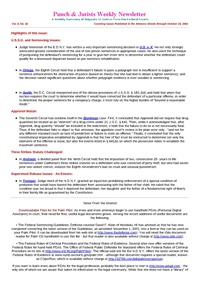Here the Court held hat a defendant may be medicated with anti-psychotic drugs to ensure his competency to stand trial, even though the defense announced its intention to offer an insanity defense.
In this case the Court addressed otherwise innocent activity in the context of reasonable suspicion, stating: "This Court is aware that under the totality of the circumstances test it is possible that "objective facts, meaningless to the untrained" can provide the basis for reasonable suspicion. However, some factors may …
The defendant in this case, a government employee in the District of Columbia, was accused of steering clients to a Medicaid facility in exchange for various benefits. He was convicted at trial of conflict of interest and conspiracy, under the provisions of 18 U.S.C. §§ 208(a) and 371. The …
In this case, the Sixth Circuit joined with all the other Circuits in holding that the delayed filing of a certification by the Government, as required when it appeals in a criminal case under the provisions of 18 U.S.C. § 3771, "although disfavored, does not divest appellate courts of …
Here a divided panel from the Ninth Circuit held that the imposition of two, consecutive 25- years-to-life sentences under California’s three strikes statutes on a defendant who was convicted of petty theft constitutes cruel and unusual punishment.
In a decision with far more bark than bite, a divided …
The defendant in this case argued on appeal, inter alia, that the district court had erred by excluding testimony regarding his training and experience in the Coast Guard Auxiliary as habit evidence under Federal Rule of Evidence 406. Rule 406 provides: "Evidence of the habit of a person or …
One of the appellants in this case, Sonya Polmanteer, challenged the sentence she received after a jury found her guilty of possession of methamphetamine with intent to distribute, in violation of 21 U.S.C. § 841. Sonya had been a passenger in a car that was being driven in Iowa …
Here, the Seventh Circuit held, inter alia, that Apprendi does not require that drug quantities be treated as an “element” of a drug crime and that the failure to include the quantity of drugs in the indictment does not create a jurisdictional defect.
More than any other Circuit, …
This is not just another sentencing decision: it is actually an important and thought-provoking exposition in which a highly-respected jurist issued a call for greater consideration of alternatives to the lengthy and automatic prison sentences imposed in most criminal cases. In advocating a greater use of non-custodial sentences, Judge …
Here the court held that the district court's presence during sentencing negotiations with repect to a defendant who had already pled guilty, while troubling, did not violate Rule 11(e) which prohibits court participation in plea agreement discussions.
Here, one of the issues raised on appeal was whether a …
The defendant in this case argued that the district court plainly erred under Apprendi v. New Jersey, 530 U.S. 466, 147 L. Ed. 2d 435, 120 S. Ct. 2348 (2000), by sentencing him to five years of supervised release because the jury made no finding regarding drug quantity. He …
In this case the defendant contested the use of a sentencing enhancement under U.S.S.G. § 2K2.1(b)(5) for use of a gun in connection with a drug transaction, arguing that the Government had failed to prove any nexus between the firearms and the drug transaction. The Court rejected the defendant's …
